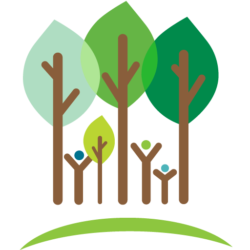How PARTNERS Began
The idea for a research network on the drivers of reforestation in the tropics emerged in October 2009 at a workshop of 60 forest ecologists at the UNAM campus in Morelia, Michoacán, Mexico. As we discussed how to better understand how, where, and why reforestation is happening across the tropics, we realized the key was to have natural scientists working side by side with social scientists, policy specialists, and restoration practitioners. Tropical reforestation issues – and solutions – involve all of these dimensions, but these groups were not talking to each other. We also needed funds to hold workshops and support network activities.
So, a small group of us banded together and submitted a proposal to the U.S. National Science Foundation, with Robin Chazdon as principal investigator and Michael Willig and Tom Rudel as co-investigators. Three proposals and three years later, we received funding from the NSF Coupled Natural and Human Systems Program in September 2013 to form the interdisciplinary research coordination network that came to be called PARTNERS (People and Reforestation in the Tropics, a Network for Education, Research and Synthesis). The project was funded through the University of Connecticut for 5 years, with an additional 1-yr extension.
Over six years, The PARTNERS network took on a life of its own, creating links with many individuals, organizations, research groups, and networks. Robin, Tom and Michael formed the initial Steering Committee, inviting others to join as the networked developed. Through a series of 12 workshops held in four countries, 186 participants met to address the deficits in our understanding of the social and ecological drivers and consequences of reforestation in the tropics.
The project began with four major goals:
- Provide interdisciplinary, peer-reviewed scholarly syntheses and document case studies of passive and active reforestation;
- Create a platform for communication among reforestation and restoration practitioners and researchers in natural and social sciences that focus on tropical reforestation;
- Provide outreach to educators, planners, and policy makers on a wide range of topics focused on reforestation, forest restoration, and forest transitions;
- Develop new research frameworks and generate innovative research collaborations that integrate social and ecological research within and across different regions.
Looking back now, we have made strong progress on these goals. Our work and impact has been substantial. Many of us have been forever changed by the experience of working in interdisciplinary groups and stepping outside of our comfort zones in a safe space. We assembled together this website to share our work with others and to unify and highlight all that we have done as a research coordination network.
PARTNERS Workshops and Working Groups
The PARTNERS grant supported a total of 12 workshops in Connecticut, San Juan (Puerto Rico), Chamela (Mexico), New York, Rutgers, Piracicaba (Brazil), and Washington, D.C. to develop synthesis work.
The May 2014 Inaugural PARTNERS workshop
Our inaugural workshop was held May 22-25, 2014 at the Center for Environmental Sciences and Engineering of the University of Connecticut (Storrs, CT). Fifty-three people attended—42 researchers and 11 representatives from nine NGO partners. Researchers came from 34 universities in 14 countries, and broadly represented the natural and social sciences. At this meeting we also interviewed participants to create a short PARTNERS video, which still captures the essence of the network today.
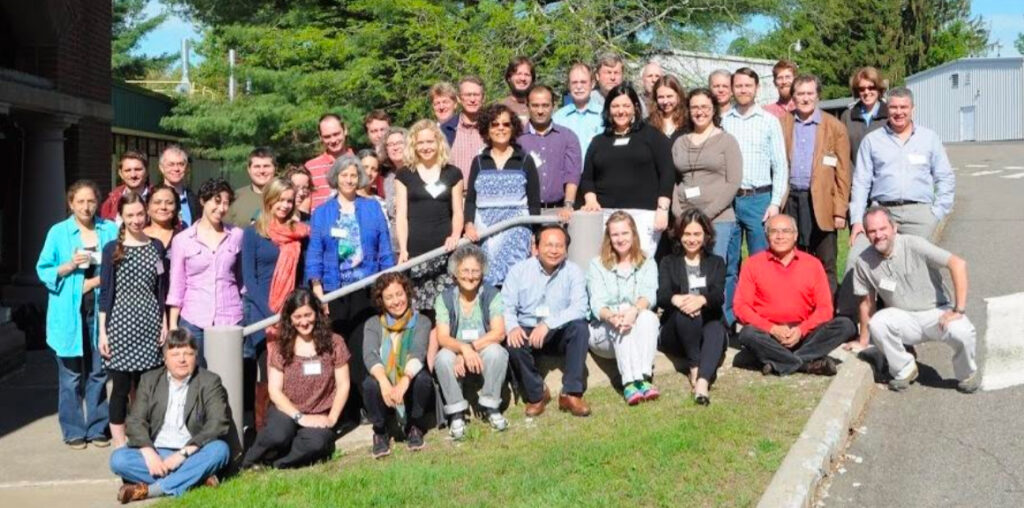 Five working groups were formed and designed synthesis projects during the workshop:
Five working groups were formed and designed synthesis projects during the workshop:
- Socio-ecological understanding of forest transitions
- Reforestation and socio-ecological resilience
- Climate change adaptation and mitigation through reforestation
- Costs and benefits of reforestation
- Forest definitions in the age of reforestation
PARTNERS became a big part of our lives for the next six years. We have an active following on Facebook PARTNERS Member Discussion Group and Twitter. Collaborations and manuscripts became to take shape, crossing boundaries between countries and disciplines, and bridging the science, policy, and practice of reforestation in all its dimensions.
We established active partnerships with organizations working internationally in the area of reforestation, landscape restoration, agroforestry, and land-use issues. We forged relationships with ELTI (Environmental Leadership Training Initiative), FAO’s Forest and Landscape Restoration Mechanism, EcoLogic Development Fund, the Tropical Forests and People Center at the University of Sunshine Coast (Queensland, Australia) and the International Institute of Sustainability (IIS, Rio de Janeiro, Brazil). We strengthened linkages with WeForest, IUCN (International Union for the Conservation of Nature), Global Restoration Initiative of WRI (World Resources Institute), CIFOR (Center for International Forest Research), ICRAF (World Agoforestry Center), CATIE (Center for Agricultural Training and Research), IFRI (International Forestry Resources and Institutions), and the IFRI/FLARE Network (Forests & Livelihoods: Assessment, Research, and Engagement).
The October 2015 PARTNERS Workshop
The second major PARTNERS workshop was held 21-25 October, 2015 at the Center for Environmental Science and Engineering in Storrs, CT on. The theme of the workshop was “Making it happen: Motivating and enabling forest restoration and regeneration.” We hosted 48 participants from 13 countries.
Five new working groups were initiated during the workshop:
- Spatial prioritization of natural regeneration;
- Economic incentives for natural regeneration;
- Governance and legal frameworks for forest regeneration and restoration;
- Certification and restoration value chains;
- Corporate responsibility and public-private partnerships.
The workshop involved active participation of members from the Center for International Forest Research (CIFOR), the International Center for Agroforestry (ICRAF), the Tropical Agricultural Research and Higher Education Center (CATIE), and from NGO and institutional partners including Rainforest Alliance, EcoLogic, Environmental Leadership and Training Initiative (ELTI), Network of Conservation Educators and Practitioners (NCEP), Greenwood, EcoAgriculture Partners, Union of Concerned Scientists (UCS), and WRI-Brazil. The governance and legal frameworks working group planned a Special Issue of World Development Perspectives, edited by Sarah Wilson, Dominique Cagalanan, and Ashwini Chattre that focused on case studies of governance of Forest and Landscape Restoration.
An education session featured descriptions and demonstrations of educational modules, including an educational game to explore social and ecological trade-offs in tropical reforestation. Another teaching module was developed in collaboration with ELTI (Environmental Leadership Training Initiative) by the working group on Stakeholder Engagement in Tropical Reforestation: A Case Study from Mexico, based on their multi-stakeholder workshop held in Chamela, Mexico in January 2015.
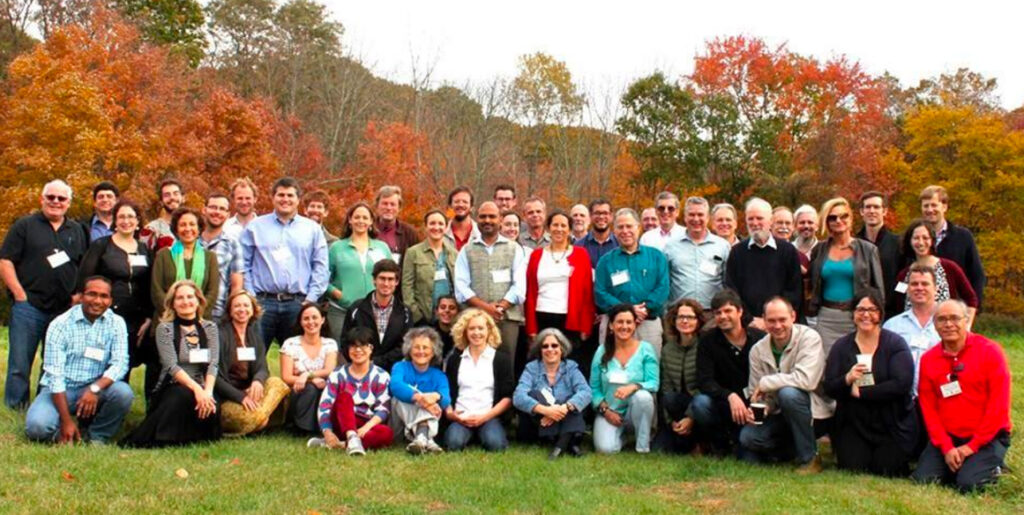 In 2016-2017, PARTNERS organized and co-funded two workshops:
In 2016-2017, PARTNERS organized and co-funded two workshops:
Global hotspots for tropical forest restoration (Sept. 2016, Piracicaba, São Paulo, Brazil, hosted by the University of São Paulo/ESALQ)
New trends in tropical forest transitions (May 2017, hosted by Tom Rudel at Rutgers University)
From 2-4 May 2018, PARTNERS held an innovative Communications Workshop in Washington, DC, hosted by WRI and IUCN. The workshop focused on communicating our research to the public, to decision-makers, and to donors/funders. The workshop included 17 participants, 1 facilitator, 3 media trainers, 3 science journalists, 3 professionals who work on restoration issues and policy, and 3 representatives of donor groups (Global Environmental Fund, Climate and Land Use Alliance, Critical Ecosystem Partnership Fund). At the workshop we charted a plan to provide informative briefs about our work on our website with links to researchers and related work, leading to the development of this Key Messages Website.
In October 2018 a small workshop was held in Colorado to discuss the future of PARTNERS. We sketched out some ideas about forming a new organization to link interdisciplinary science with practice to realize the potential for Forest and Landscape Restoration (FLR) around the world. Our final PARTNERS-supported workshop was held in Colorado in May 2019 with the goal of designing this website, which will serve as a long-term legacy of our 6-year project and as a springboard for future synthesis and outreach activities.
Collaborations Between PARTNERS and Other Groups
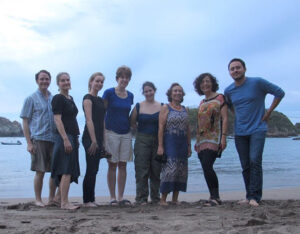 In addition to organizing our own workshops and working groups, PARTNERS coordinated with other groups to organize joint workshops and activities. Over 60 people participated in “The Role of Natural Regeneration in Large-scale Forest and Landscape Restoration: Challenge and Opportunity,” a workshop co-organized by PARTNERS, IUCN, WRI, and the International Institute for Sustainability (IIS) in Rio de Janeiro on 19-21 November, 2014. The workshop was supported by several organizations and many PARTNERS members participated. Based on the workshop, a special issue of Biotropica, co-edited by Robin Chazdon and Maria Uriarte, was published on this topic in October 2016.
In addition to organizing our own workshops and working groups, PARTNERS coordinated with other groups to organize joint workshops and activities. Over 60 people participated in “The Role of Natural Regeneration in Large-scale Forest and Landscape Restoration: Challenge and Opportunity,” a workshop co-organized by PARTNERS, IUCN, WRI, and the International Institute for Sustainability (IIS) in Rio de Janeiro on 19-21 November, 2014. The workshop was supported by several organizations and many PARTNERS members participated. Based on the workshop, a special issue of Biotropica, co-edited by Robin Chazdon and Maria Uriarte, was published on this topic in October 2016.
Together with WeForest, we organized a Forest Landscape Restoration Framework Dialogue in Sept. 2017 in Piracicaba, São Paulo, Brazil, hosted by the Tropical Silviculture Laboratory of the University of São Paulo/ESALQ. He, we formed the FLoRES Taskforce (Forest Landscape Restoration Standards), a joint effort by PARTNERS and WeForest. The FLoRES Taskforce held a second workshop in Nairobi, Kenya on 31 August- 1 September 2018, hosted by ICRAF following the Global Landscape Forum, with support from the International Center for Agroforestry (ICRAF), WeForest, and PARTNERS. A third PARTNERS, WeForest, the Tropical Forests and People Research Center, and the ACIAR ASEM project on Enhancing Livelihoods through Forest and Landscape Restoration co-organized a third FLoRES workshop on 22-23 February 2019 on conceptual and working frameworks for FLR in the Philippines in conjunction with an international FLR conference in Manila on 25-27 February, 2019.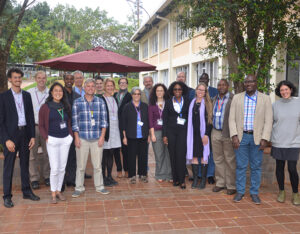
Together with IFRI/FLARE (Arun Agrawal and Sarah Wilson, post-doc), PARTNERS co-organized three workshops on the Social Dimensions of Reforestation Pathways in the Tropics, funded by the National Socio-environmental Synthesis Center in Annapolis, Maryland. The first workshop in April, 2016 focused on “Reforests, rural livelihoods, and economic benefits.” The second workshop in April 2017 focused on “Governing Tropical Forest Restoration,” and we are now organizing a special issue of the journal Land Use Policy with synthetic framework papers and case studies from around the world. The third workshop was held in April 2018 on “Criteria and Indicators of FLR.”
During March-May 2018, PARTNERS organized a series of 3 webinars on “Tropical Reforestation and Climate Change” in collaboration with ELTI (Environmental Leadership and Training Initiative) at Yale University. The webinars had a high level of participation and can be downloaded for free.
Webinar #1 (March 29, 2018): Reforestation and Forestry in the Tropics as Climate Change Mitigation Solutions, 121 participants DOWNLOAD
Webinar #2 (April 18, 2018): Reforestation and Biodiversity as Climate Change
Adaptation Solutions, 64 participants DOWNLOAD
Webinar #3 (May 9, 2018): The Social Aspects of Reforestation for Climate
Change: Where, When and How? 38 participants DOWNLOAD
Together with the Tropical Forests and People Research Centre based at the University of the Sunshine Coast, PARTNERS co-organized the International Conference on Forest and Landscape Restoration: Making it Happen in Manila, Philippines on 25-27 February, 2019. The conference included 139 participants from 44 different institutions and 23 countries.
The Future of PARTNERS
Many of us would like PARTNERS to continue, and we are exploring new sources of funding for workshops and activities. This work is far too important, especially as we are entering the UN Decade of Ecosystem Restoration. The world at large is recognizing the critical importance of reforestation, restoration, and landscape management as natural solutions to mitigate climate change and biodiversity loss. We will continue to forge ahead to strengthen connections between researchers, policy-makers, and practitioners to create a better world through the many forms of reforestation in the tropics.
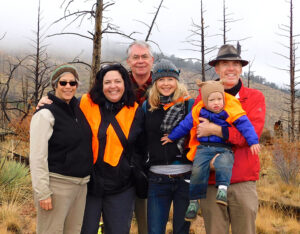 An idea emerged at the Future of PARTNERS workshop in October 2018 to form a new organization, Forestoration Partners, to provide services, tools, and expert-guided research synthesis to envision, catalyze, support, and empower organizations, government agencies, and communities to implement FLR from the ground up. We are planning to move forward with this plan in the fall of 2019. Based on the broad network we created through PARTNERS, Forestoration Partners aims to develop partnerships and contracts with organizations, groups, and individuals to address gaps in implementation and practice of FLR. We plan to work closely with Environmental Leadership and Training Initiative (ELTI) to develop capacity building materials for distribution within a broad network of FLR practitioners working in many different countries and contexts. We also our planning our own flagship project: the FLR Case Study Bank and Atlas. We propose to create a systematically cataloged and searchable global bank of FLR case studies and an associated interactive Atlas. The FLR Case Study Bank will provide a critically needed independent information hub where restoration practitioners and researchers share experiences and summarize lessons learned from different types of interventions and contexts.
An idea emerged at the Future of PARTNERS workshop in October 2018 to form a new organization, Forestoration Partners, to provide services, tools, and expert-guided research synthesis to envision, catalyze, support, and empower organizations, government agencies, and communities to implement FLR from the ground up. We are planning to move forward with this plan in the fall of 2019. Based on the broad network we created through PARTNERS, Forestoration Partners aims to develop partnerships and contracts with organizations, groups, and individuals to address gaps in implementation and practice of FLR. We plan to work closely with Environmental Leadership and Training Initiative (ELTI) to develop capacity building materials for distribution within a broad network of FLR practitioners working in many different countries and contexts. We also our planning our own flagship project: the FLR Case Study Bank and Atlas. We propose to create a systematically cataloged and searchable global bank of FLR case studies and an associated interactive Atlas. The FLR Case Study Bank will provide a critically needed independent information hub where restoration practitioners and researchers share experiences and summarize lessons learned from different types of interventions and contexts.
Working Behind the Scenes
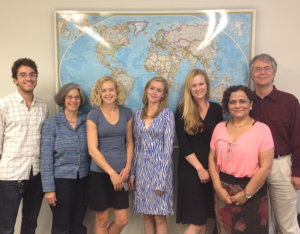 Julian Moll-Rocek ably assisted with organization for both of the large workshops held at UConn. Julian, Claire Salisbury, Trevor Caughlin, Leland Werden, Sharif Mukul, and Sarah Wilson also helped with communications and development of the website. Bill Kelly, of Kelly Design Co. has been our web designer and content manager since 2015. Leah Bluntschli (graphic designer), Scott Francisco (facilitator), Trevor Caughlin, Cristina Barber Alvarez-Buylla, and Pedro Brancalion contributed to the Key Messages Website content and design. In September 2017, Sarah Wilson was hired as a postdoctoral associate with PARTNERS and continued to work through August 2019. Sarah and Robin Chazdon worked closely together from their respective homes in Montreal, Canada and Boulder, Colorado to implement PARTNERS activities, including the creation of this website.
Julian Moll-Rocek ably assisted with organization for both of the large workshops held at UConn. Julian, Claire Salisbury, Trevor Caughlin, Leland Werden, Sharif Mukul, and Sarah Wilson also helped with communications and development of the website. Bill Kelly, of Kelly Design Co. has been our web designer and content manager since 2015. Leah Bluntschli (graphic designer), Scott Francisco (facilitator), Trevor Caughlin, Cristina Barber Alvarez-Buylla, and Pedro Brancalion contributed to the Key Messages Website content and design. In September 2017, Sarah Wilson was hired as a postdoctoral associate with PARTNERS and continued to work through August 2019. Sarah and Robin Chazdon worked closely together from their respective homes in Montreal, Canada and Boulder, Colorado to implement PARTNERS activities, including the creation of this website.
Financial Support for PARTNERS
Funding for PARTNERS activities came from the U.S. National Science Foundation. The inaugural workshop received additional support from the Office of Global Affairs at the University of Connecticut. The IUCN/DIFD Know-for Network provided additional support for the Forest Definitions Working Group.


